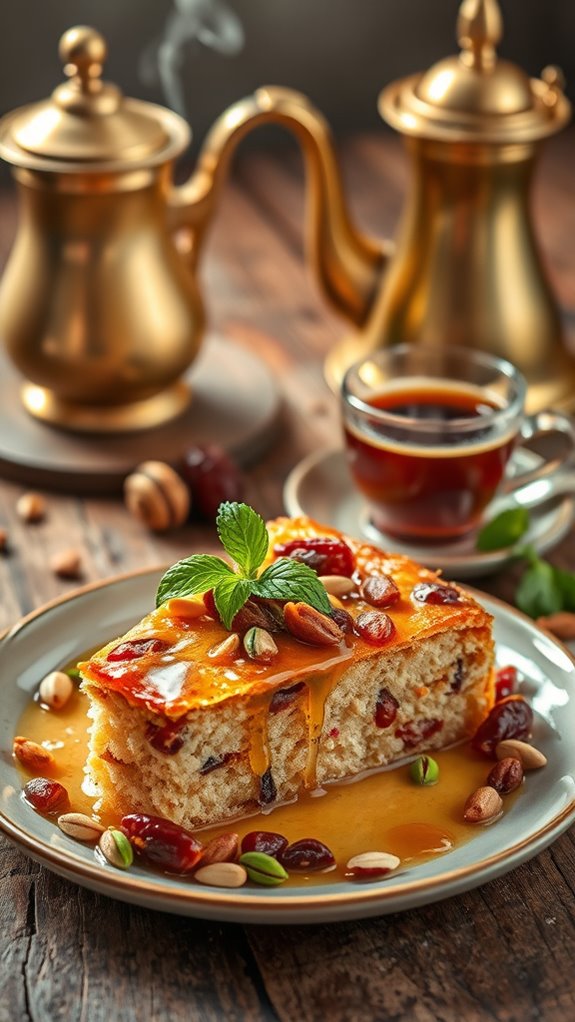An Arabian cake is like a warm embrace, inviting you into a world rich with flavor and tradition. You might wonder how a simple blend of flour, sugar, and spices can hold such significance in Middle Eastern culture. This cake isn't just dessert; it's a symbol of hospitality. As you explore its ingredients and history, you'll uncover the secrets that make it a cherished treat at gatherings and celebrations.
History
When you explore the history of Arabian cake, you'll find a rich tapestry of culinary traditions that reflect the region's diverse cultures and influences.
Arabian cake boasts ancient origins, tracing back to the nomadic tribes of the Arabian Peninsula, who created simple yet flavorful desserts using locally available spices and nuts.
Over centuries, trade routes introduced new ingredients, resulting in variations that catered to local tastes.
The cultural significance of Arabian cake is profound; it often graces celebrations, weddings, and festive occasions, symbolizing hospitality and generosity.
Each bite carries a story, connecting generations through shared recipes and timeless flavors.
You'll discover that every region has its unique twist, celebrating the unifying power of food in Arabian culture.
Recipe

Arabian Cake is a delightful dessert known for its rich flavors and moist texture, often enjoyed during celebrations and gatherings in Middle Eastern countries. This cake typically features aromatic spices, nuts, and a hint of sweetness from dates or honey, making it a unique treat that encapsulates the essence of Arabian cuisine.
Its soft crumb and intriguing flavor profile make it a beloved favorite among those who appreciate culinary diversity and cultural heritage.
To prepare this traditional cake, you'll need to gather a few essential ingredients that not only contribute to its flavor but also reflect the region's culinary influences. The key components include flour, sugar, nuts, and various spices that create a beautiful harmony in each bite.
Whether served plain or garnished with a drizzle of syrup, Arabian Cake is a dessert that will leave a lasting impression on your taste buds.
Ingredients:
- 2 cups all-purpose flour
- 1 cup granulated sugar
- 1 cup plain yogurt
- 1 cup vegetable oil
- 4 large eggs
- 1 teaspoon baking powder
- 1 teaspoon baking soda
- 1 teaspoon ground cardamom
- 1 teaspoon ground cinnamon
- 1 cup chopped dates or dried figs
- 1 cup mixed nuts (almonds, walnuts, or pistachios)
- ½ cup honey (optional, for drizzling)
Cooking Instructions:
Preheat your oven to 350°F (175°C) and grease a 9×13 inch baking pan. In a large mixing bowl, combine the flour, sugar, baking powder, baking soda, cardamom, and cinnamon.
In another bowl, whisk together the yogurt, vegetable oil, and eggs until well combined. Gradually add the wet ingredients to the dry mixture, stirring until just combined.
Fold in the chopped dates and mixed nuts, then pour the batter into the prepared baking pan. Bake for about 30-35 minutes, or until a toothpick inserted into the center comes out clean.
Let it cool slightly before serving or drizzling with honey.
Extra Tips:
To enhance the flavor of your Arabian Cake, consider soaking the chopped dates in warm water or tea before adding them to the batter; this will plump them up and infuse the cake with additional moisture.
You can also experiment with different spices, such as nutmeg or cloves, for added depth in flavor. For a decorative touch, sprinkle some extra chopped nuts on top before serving, and serve it with a side of whipped cream or vanilla ice cream for a delightful contrast.
Enjoy your Arabian Cake with a cup of traditional Arabic coffee or mint tea for a complete cultural experience!
Nutritional Guide
The nutritional profile of Arabian Cake offers a delightful balance of ingredients that not only tantalize your taste buds but also provide essential nutrients.
This cake often features ingredients like dates, nuts, and yogurt, each contributing unique nutritional benefits. For instance, dates are rich in fiber and essential minerals, promoting digestion and overall health.
Nuts add healthy fats, protein, and antioxidants, which support heart health and energy levels. Yogurt, with its probiotics, enhances gut health.
An ingredient analysis shows that this dessert can satisfy your sweet cravings while delivering important nutrients.
Final Thought
While indulging in a slice of Arabian Cake, you're not just treating yourself to a delicious dessert but also embracing a culinary tradition that celebrates the richness of its ingredients.
This cake, with its distinct flavors, showcases the cultural significance of Arabian hospitality, inviting you to share in its sweetness. Each bite reveals taste variations influenced by regional spices, nuts, and fruits, making every experience unique.
As you savor the moist texture and aromatic undertones, you're connected to the stories and celebrations of generations before you. Whether you prefer a traditional recipe or a modern twist, Arabian Cake unites diverse palates and reflects a vibrant heritage.
